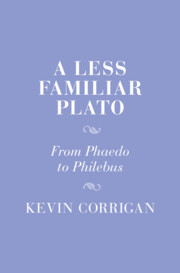Book contents
- A Less Familiar Plato
- Cambridge Studies in Religion and Platonism
- A Less Familiar Plato
- Copyright page
- Contents
- Acknowledgments
- Abbreviations
- Introduction
- Part I Embodiment and Participation in the Divine
- Part II Introduction to the Republic and Philebus
- 3 The Training of Perception
- 4 The Nonhypothetical Good
- 5 Is the Idea of the Good beyond Being?
- 6 The Philebus
- Part III Introduction to Love, Myth, Erotikē Technē, and Generative Epistēmē
- Appendix Scientific Perception or Sharp Seeing in the Middle and Late Dialogues
- Primary Texts
- General Bibliography
- Index
5 - Is the Idea of the Good beyond Being?
from Part II - Introduction to the Republic and Philebus
Published online by Cambridge University Press: 26 October 2023
- A Less Familiar Plato
- Cambridge Studies in Religion and Platonism
- A Less Familiar Plato
- Copyright page
- Contents
- Acknowledgments
- Abbreviations
- Introduction
- Part I Embodiment and Participation in the Divine
- Part II Introduction to the Republic and Philebus
- 3 The Training of Perception
- 4 The Nonhypothetical Good
- 5 Is the Idea of the Good beyond Being?
- 6 The Philebus
- Part III Introduction to Love, Myth, Erotikē Technē, and Generative Epistēmē
- Appendix Scientific Perception or Sharp Seeing in the Middle and Late Dialogues
- Primary Texts
- General Bibliography
- Index
Summary
What is a reasonable interpretation of Socrates’ statement that the Good is “beyond being?” Does this mean that the Good has no being at all, as Rafael Ferber and Gregor Damschen maintain?2 This would mean that the Idea of the Good is ἐπέκεινα τῆς οὐσίας in the sense of being beyond being altogether: ἐπέκεινα τοῦ ὄντος. This is a position (when the Good is identified with the One) espoused by Plotinus, later Neoplatonists, and many others, including Schleiermacher, and more recently the Tübingen school. Hans Joachim Krämer, one of the major figures of the Tübingen school, for instance, emphasizes the testimonies of Aristotle, Iamblichus, and Proclus about the One of Speusippus, that it is “not even a being” and sees this as an account of the beyond-beingness of the One in Plato’s thought (, 41).3
- Type
- Chapter
- Information
- A Less Familiar PlatoFrom Phaedo to Philebus, pp. 151 - 164Publisher: Cambridge University PressPrint publication year: 2023

